Book Reviews by Genre: Short Stories
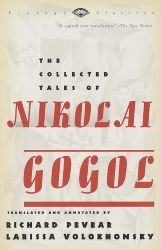
The Portrait by Nikolai Gogol is one of his best short stories centering around a penniless artist, Chartkov, struggling to make his name in the art world and finds himself entranced by a portrait he buys at a merchant shop. With a steely face, build of a giant, and eyes that seem to pierce the soul, the portrait that he buys on an impulse at a run-down shop carries a mystery with it that haunts Chartkov both in his waking hours and in his sleep. As he is overcome by his financial difficulty, the strange portrait that he stashed away for fear of its gaze changes his life forever. With flowing imagery and an intrinsic description of human nature and its afflictions, The Portrait latches onto the reader’s heart and presents them with a fascinating account of Chartkov and his peculiar encounter with the portrait with uncanny realism and blended fantasy.
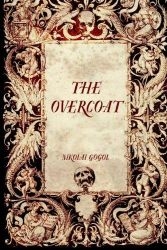
Nikolai Gogol's "The Overcoat" is a simple yet intriguing story of a man set upon buying a new overcoat despite his poverty-stricken life. Enamored with his job of copying documents at the office, Akaky never takes notice of the world around him, even when all the other workers around him gibe at his love for something so mundane as replicating documents and the intense manner of which he regards this dull job. However, he is sharply brought into reality when winter brings frigid weather, and he realizes his threadbare and tattered overcoat simply will not sustain Russia's winter. He begins his speculations into buying a new overcoat with as much zeal as he puts into his office work, yet he hardly expects what the future holds both for him and his overcoat. Both amusing and thought-provoking, Nikolai gives the reader insight into the life of an eccentric office worker laboring during the harsh winter and successfully blends farce comedy with blunt realism to create a short story that stirs the emotions and leaves the reader satisfied.
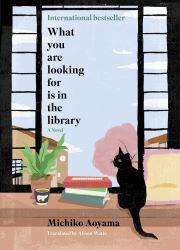
"What You Are Looking For Is in the Library" is a book about a library connected to a community center and the unusually perceptive librarian, Sayuri Komachi. The book is told through five stories of people . Along with the books they came for, Mrs. Komachi gives them an unrelated book and a felt gift. This leads them to discovering new perspectives on their problems and their lives.
All the characters in this book are delightful. Since there are five stories, each with a different main character, it would take too long to go over all of them. However, the standouts for me were Tomoka, Natsumi, and Mrs. Komachi herself. Tomoka was relatable in her struggles, but also had a proactive nature that made her likeable. Natsumi has an interesting story about motherhood that isn't seen much in modern media. And of course Mrs. Komachi tows the line between mysterious and friendly in a charming way. Every once in a while there will be a character that appears in multiple stories, and the crossovers are pleasant without being distracting.
The stories themselves are all quite simple. Someone receives insight after reading a book, usually talking with friends and neighbors as they decide on their life's path. Though they're all quite short, none of them feel incomplete or rushed.
I would recommend this book for people looking for a comforting read or a story about the power of books.
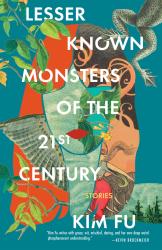
Canadian author Kim Fu provides 12 entertaining, oft challenging and daring stories in her latest award-winning collection (Feb. 2022, 232 pages).
She does a skillful job of taking extraordinary circumstances, such as a tween girl sprouting wings and turning that into a believable rite of passage. In another, a Bridezilla meets a sea monster and what follows is a witty commentary on social expectations and ecological consequences.
All the stories blur the lines between reality and the fantastic, and the weird and mundane, all while shining a spotlight on human contradictions concerning sexuality, death, guilt and technology.
As a result, all prove memorable for different reasons, making this collection one of the few worth reading in its entirety.
AWARDS: An NPR, Book Riot, Chicago Public Library, Tor.com, South China Morning Post, Ms. Magazine, and Shelf Awareness Best Book of 2022; 2023 Pacific Northwest Book Prize Winner; Time Magazine Top 10 Fiction Book of 2022
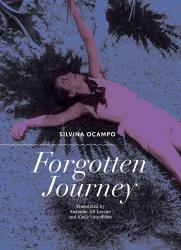
Do you like very short stories that close the curtain before you fully know the resolution? Do you like real-life mundane events rendered slightly haunting? Do you like that odd pit in your stomach when something slightly horrifying is delivered in a naive and innocent voice? I think you'll like Silvina Ocampo's translated short stories anthology Forgotten Journey.
The stories are from another time (late 19th and early 20th century) and place (Argentina?) and the characters generally reflect that. I feel as though I got a (distorted) glimpse into the lives of a variety of characters -- well-off and poor, urbane and rural, altruistic and self-serving -- sometimes a mix of all of these from one scene to the next. I particularly enjoyed the creative and evocative descriptions -- one that sometimes evokes the banalest of objects or environments into a fantastically peculiar observer of the eccentricities of people.
Anyway, I'm grateful that PPLD has books like these, and I plan to explore more of Ocampo's and her contemporaries' oeuvre.
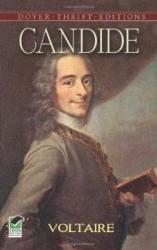
The novel “Candide” is a satire on the philosophy of optimism given by German philosopher Wilhelm Leibniz. The concept of Optimism suggests that everything is going to end well in this best world. It was written by Voltaire, one of the most famous and well-read novelists in the world. The word "Candide" means an innocent, simple, and kind-hearted person. The protagonist of the novel traverses across the world and comes across many disasters and faces many hurdles. Pangloss defends optimism by saying that everything happens in this best world for a reason, and it doesn't matter whether it is good or deplorable.
The story opens with Candide, who lives in a noble castle. In the beginning, he is a strong believer of his master's optimism. But as the story proceeds on, Candide gradually begins to doubt in optimism when he is expelled from his castle for loving the daughter of the Baron. After that, another incident happens as the Bulgarians attack the castle of Baron and burn it to the ground, and they massacre all the ladies and children without mercy. After having seen all this, Candide is forced to say that if this world is the best, then why are all these disasters happening to those who don't deserve to be punished? Optimism is useful, and he calls it
"The mania of maintaining that everything is well when we are wretched."
After being expelled from his hometown, he enters the country of Eldorado and receives a very warm welcome from the people of this country. Here, the people nature lover, and their behaviour towards guests is very good and polite. This place is full of beautiful, prodigious mountains, green fields, people love each other, and Candide falls in love with this place. They are with four soups and two roasted monkeys for dinner without taking money. Candide thinks Pangloss was right: all is for the best. The dilemma of Candide about optimism goes on throughout the novel.
Candide offers us some significant themes. Let’s discuss those one by one. On many occasions, the cruelty of people can also be clearly seen in this book. For instance, on his way to Suriname, he sees a physically impaired negro. Candide asks him who did to you?, and the negro replies that we are given only a pair of cotton drawers as clothing twice an year. We work in sugar mills, and when we are tired of working and try to run away or refuse to work, they (white men) cut our legs and hands. We pay this price for the sugar you eat in Europe. His sorrows wrench us when he says animals are also less miserable than we are and he questions we too are human beings and the children of Adam, then why are we treated so horribly?
The tale of an old woman is also very painful. She is the daughter of Pop Urban X and the princess of Palestrina. She is a beautiful lass of honour with blue eyes and curly hair. While she is travelling with her mother to another place named Gaeta, they are attacked and captured by a Salle pirate. It is not easy for a princess to be taken with her mother as a slave to Morocco. She is still a virgin, but doesn't remain long. The flower that was reserved for the Prince of Massa Carrara is now perished by a negro who thinks he is doing her a great honour. Her mother and other women are raped and torn into pieces by these scoundrels.
Candide is a kind of character that shows we should not lose hope or impulse to reach our destination. For instance, Candide is kicked out of his castle because of his love for Cunegonde, whom he adores so much. then it is also reported that Cunegonde is dead, but he doesn't believe it, and after struggling for a long time, he finds her again and loses her again, but at last he marries his buff because he was determined to find her and never gave up.
The same whimsy is highlighted by Mian Muhammad Bakhsh in his tale “ Saif ul Malook”. The prince falls in love with a fairy named “Badi u Jamal”and sees her in his dreams. He sets out on a journey to find her, even though he doesn't know where she lives. His determination leads him to his fairy.
Giving power to someone over others makes people evil. The person to whom you give power will begin using it against others. As Shakespeare says:
"Power corrupts, and absolute power corrupts absolutely."
With great power there also comes great responsibility. According to the testimony of philosophers, exalted rank is very dangerous. For example, Eglon, the king of Moabites, was murdered by Ehud, and kings like Zedekiah and Jeconiah were made slaves. They all were perished because they had used their power for dark purposes. At the end of the day,
"We have to cultivate our garden.” (Voltaire)
Men are never contented with what they have, and their greed is unlimited. I think Tolstoy was right.
"Men are greedy by their nature."
After becoming the Prince of Persia, Candide rewards significant scientists and literary but they are still not satisfied and happy. Candide is quite with human nature and knows that men will never be satisfied with whatever they get because of their greedy nature, which cannot be changed easily.
In short, Candide is a master piece of Voltaire, and effects its readers deeply. Before reading it, I was desperate to know Voltaire's view on optimism. I enjoyed it a lot and might read it again because of its readable and diverse meaning under the layers.
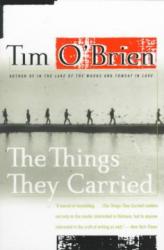
The Things They Carried is a modern necessity. A series of stories and reflections follow the journey of a hypothetical O'Brien and his squad as they 'hump' through the mountains and forests of Southeast Asia during the Vietnam War. The book plays with the ideas of reality and storytelling, and forces readers to construct a robust and complex understanding of the stories of war and the life after. At points, it becomes almost impossible to discern between reality and falsities, and the book itself is an intellectual journey. The stories tell the seemingly exciting and eventful moments of the war, but put a special emphasis on the trauma and shocking notes of the war. O'Brien contrasts each element with an essential counterpart: excitement with terror, nonfiction with fiction; storytelling with teaching. It's this contrasting of truths that makes The Things They Carried a staple on any bookshelf, and a read worthy of any audience.

Interpreter of Maladies by Jhumpa Lahiri is a collection of nine short stories about cultural differences. In each of the nine stories, the beautifully composed characters are taken through inspirational journeys, whether conflicts about romance, communication, cultural differences between India and America, or separation. Not all endings are happy, but a lesson can be learned from each story. It is a must-read book that challenges cultural differences and will transform a mindful reader's perspective. Overall, I would rate the book five out of five stars.
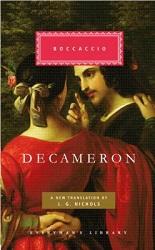
In plague struck Italy around the 1350s, 3 young adult boys and 7 teenage girls as well as their servants hide out in various castles while telling each other stories to pass the time. Each of them has to tell one story per day. For each day there is a new theme decided by the"ruler" of that day. These themes include; Misadventures with happy endings,Tragic loves, Bawdy loves, Munificence, and Avoiding Misfortune with witty remarks.
Though this is a good and classic book it is not for everyone due to it having mature sexual themes, so if you do not like such things either dont read this book or stick to the days that arent about things like those... also watch out for Dioneo's stories because he can say a story on whatever he likes. Alltogether a good book if not for everyone.
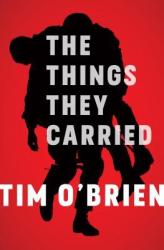
The Things They Carried by Tim O’Brien horrifically recalls Tim’s time during war, in what he calls “A true war story that isn't real”. This book recreates the experiences O’Brien went through during wartime, and is written in a very grotesque manner. The story jumps around from timeline to timeline, in a way that a lot of the time you aren't sure what perspective you’re reading from. While written very well, O’Brien has a habit of making every character seem like a horrific person and puts himself on kind of a metaphorical pedestal, in what seems to be an attempt to reconcile with the guilt he faced from the atrocities committed by him and his platoon. I would definitely recommend this book to others, despite its faults, but I believe the most important thing to know going into this book is that the events described are so grotesque they seem like made up fantasies or true stories that have been modified to seem worse than they actually are, which is part of O’Briens intention of telling the story the way he remembers it happening, not the way that it actually happened.
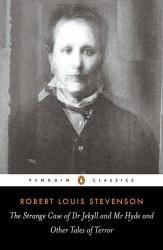
The Strange Case of Dr. Jekyll and Mr. Hyde by Robert Lewis Stevenson is a novel about a scientist in London, Dr. Jekyll, that has the misfortune of having to control and mask his alter identity, Mr. Hyde. After some unfortunate events partake, others begin to realize that the wise Dr. Jekyll has an alter identity. This novel has an unpredictable ending that left me stunned. I thought that the book was really good due to the continuously moving plot and the amazing characters that create a wonderous mystery throughout the book. I was required to read this book for school and I would definitely recommend it for readers that are in middle school and beyond that enjoy a great science fiction or mystery novel. Reviewer Grade: 9

The Strange Case of Dr. Jekyll and Mr. Hyde by Robert Louis Stevenson is a novel about a scientist in London, Dr. Jekyll, who struggles with controlling his alter ego, Mr. Hyde. As he attempts to mask his other personality, horrifying events occur that present the horrible personality of Mr. Hyde. Other citizens begin to discover the connection between Dr. Jekyll and Mr. Hyde as the novel finishes with a jaw dropping climax and resolution. I was required to read this book for school and I would recommend it for readers middle school and above. I really enjoyed the progression of the plot and the ending that was unpredictable. Reviewer Grade: 9
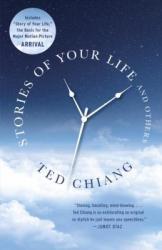
After reading Exhalation , I found myself in search of more stories by Ted Chiang. This led me to Stories of Your Life and Others. Partly because this collection included many of Chiang’s earlier stories, not all of them were great pieces of literature like the ones in Exhalation. I could tell that Chiang was still trying to find his voice as a writer as he explored many science fiction topics common to the genre. While not all of the stories are fantastic, there are enough good ones to warrant reading this collection.
What’s a little disappointing is how some of the ideas Chiang explores in this book are truly interesting topics, but the execution of these stories feels a little too erudite for the common reader. I appreciate Chiang’s later ability to humanize these ideas (as shown by my love of Exhalation), but he just wasn’t quite there yet with these early works. Still, there are a handful of award-winning stories in this book, including “Tower of Babylon” and “Hell Is the Absence of God.” Chiang’s ability to combine science and religion is second to none, and these stories prove as much.
One story in this book stands out from the rest. It makes sense that “Story of Your Life” was the titular choice for this book. For those unaware, the movie Arrival (2016) is based on this short story (and is a pretty close adaptation). Even if you only read “Story of Your Life,” I think you’ll get something out of this collection. It is by far the most approachable of these stories, and it deserved all of the awards bestowed upon it when it was originally published in the late 1990s.
A good collection of Ted Chiang’s early works that contains a few sparkling gems, I give Stories of Your Life and Others 4.0 stars out of 5.
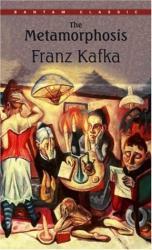
After turning into a bug, Gregor realizes he is late for work. However, it soon becomes apparent that Gregor will no longer be able to work. His family's view of him quickly changes as his previous contributions to it are quickly forgotten. This thought provoking book questions people's worth after they are lo longer able to contribute to society. Although the writing style is dry, the book is filled with allegories and symbolism that comment on the nature of individuals in society. This leaves readers to examine their own views on an individual's worth to society.
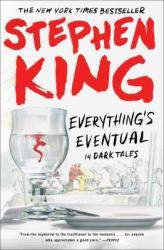
I read this book because I watched the movie “1408” which is based on the short story by Stephen King thats in “Everything’s Eventual” and I wanted to see if the book was as good as the movie. Everything’s Eventual is a book that’s full of short story’s, and while I didn’t like a few, there was also a couple really good ones! I would highly recommend one of the short story’s called “The Road Virus Heads North”. It has actually become one of my favorite Stephen King stories. Also, I personally thought it was one of his creepiest. Overall, if you are a big Stephen King fan like me, I would recommend reading this book.

Those of us who have seen Netflix’s adaptation of The Witcher will find this collection of short stories quite familiar. The first book in the series, The Last Wish introduces the titular Witcher, Geralt of Rivia, as he goes about his job ridding the world of dangerous supernatural creatures. It’s no wonder the TV series felt a little disjointed, as it had a series of short stories that were loosely connected via Geralt to work with. Still, these stories are solid and help flesh out the world where humans and creatures live together, rarely in harmony.
Told in a somewhat chronological manner, these bite-size stories often carry over and blend into each other in a way that feels natural. Actions in one story may influence the characters in another, so there is something deeper here than just a collection of short stories. While this technique is rarely used, I can appreciate how each story has a purpose in advancing the main character's overall story. That being said, not every story is as enthralling as trying to save a noble’s daughter from a curse (which was one of the best in the set).
Part of why I like this method of storytelling is how simple it is. There’s no huge overarching and complex series of events here. The only character that matters is Geralt and how he reacts to the people around him and the jobs he takes to pay the bills. While additional characters like Yennefer or Ciri help to round out the series, focusing on the series’ namesake is important for building a foundation for world-building. I almost wish more series would take this route, as it helps establish the lore before diving into the first “official” book's main plot.
Great character foundation through multiple short stories, I give The Last Wish 3.5 stars out of 5.
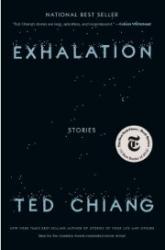
My librarian uncle introduced me to Ted Chiang recently, and I was so intrigued by such an award-winning author who wrote exclusively in short stories that I had to check out one of his books. Exhalation is a collection of these stories, and I can see why Chiang is lauded as a writer. It seems that modern science fiction is too focused on new technologies and how they can lead to utopias or dystopias. In Chiang’s stories, I saw some stark realism that took well-tread topics of the genre and examined them through a lens that was extremely realistic to how society would function with such advancements.
It was refreshing—a sigh of fresh air, or exhalation, if you will—to read stories about parallel universes, artificial intelligence, and time travel that didn’t stick to the same tropes that have made science fiction almost boring in comparison. In the end, Chiang is so concise with his language as to create these universes anchored in our reality and uncover all the intricate ways in which new technologies would change it without delving into the fluff of a full-blown novel. And perhaps that’s what makes these short stories work: focusing on how people interact with new technology, instead of just society at large.
These stories' personal nature hits home, mostly because they were pulled from current technologies and extrapolated into the fringe sciences that are on the cutting edge. For instance, we already record much of our days, so how does our memory change if we have a perfect record of the past? Additionally, how many technologies are made widely available as entertainment first, and how many interest groups pop up as fans of these technologies until they are eventually made obsolete? These and many other thoughtful topics are only some of the reasons I would recommend any fan of true sci-fi read this book.
A collection of some of the best sci-fi stories I’ve ever read, I give Exhalation 5.0 stars out of 5.
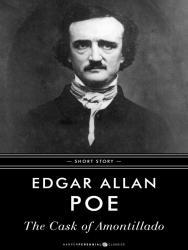
5 out of 5 stars the action and plot and the is so interesting . All the climax adding up then exploding with action . Montesor"s revenge and hate for Fortunato really driving him to kill him . Fortunato's ego get him killed because he want to prove he was better that another wine taster .And the ending just puts the cherry on top on everything when Montresor say no one has disturbed the body in 50 years
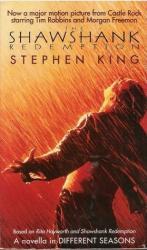
This is the best jail break story ever! I loved this short story when i read it in "Different Seasons". I read this book after seeing the movie, and I love both of them! Its about a guy named Andy Dufresne who is sentenced to life at Shawshank for the murder of his wife and her lover. In prison, he meets Red, a guy who knows how to get things. They become good friends. Andy always said he was innocent, and after being there for almost 20 years he escapes. It's a really really good story and I would highly recommend this book to anyone!
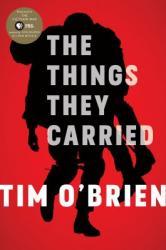
The Things They Carried is a memoir by Tim O'Brien about his experiences as an American soldier fighting in the Vietnam War. O'Brien was chosen to be drafted in 1968. This incident was extremely stressful for O'Brien who had taken a stand against the war, yet didn't want to disappoint his community. He pondered running away to Canada, but eventually decided to fight. The Things They Carried is a series of stories that are so well written. The work is a bit hard to understand just because O'Brien wrote it in a way that is not completely nonfiction. In the book, he explains this concept more in depth. Overall, I thought this book was a very well written, interesting, and educational story regarding the horrors of war from O'Brien's perspective in Vietnam.
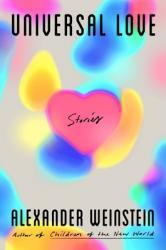
"Universal Love" is 11 short stories set in the near future, showing how people use technology to navigate relationships. In one story, a widower signs up for a program to re-create his deceased wife, only to find out his daughters downloaded a fictitious history from romance novels. Another story has testimonies of why people use on-line dating services. A third story explores the relationship of two robotic children who try to act like human children, even to the point of having real life problems and addictions. An interesting look at technology and how it could be in our not far future of how we relate to each other. One constant remains, and that is our need for human interaction, no matter the media we use to get it.
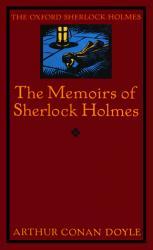
The Memoirs of Sherlock Holmes is a masterpiece of short stories. Sherlock Holmes continues to dazzle readers with his incredible deductions in these eleven short stories. From the beginning of Holmes' career in "The Gloria Scott" to large-scale crimes in "The Naval Treaty," the Memoirs of Sherlock Holmes. The introduction of Sherlock's brother, Mycroft, and his most notorious nemesis, Professor Moriarty, ensure that readers will be captivated by these stories. The Memoirs of Sherlock Holmes is phenomenal and I highly recommend it for any fan of Sherlock Holmes or crime fiction.

Almost Home is comprised of four short stories detailing 4 people who take risk of opening their hearts to new relationships. "Whale Island" is about a children's writer who is resisting falling in love with the reporter who interviews her because she has a big family secret to hide. In "Queen of Hearts', a man who was a real geek in high school has become successful and handsome as an adult and has run into the woman who he had a crush on in high school but felt out of her league. "The Honeymoon House" is a story of a photographer who finds a bridesmaid of a halted wedding destroying his house. And finally "The Marrying Kind" reunites two high school sweethearts who has a very brief marriage right when they got out of high school but were cruelly torn apart by family members. A great read if romance novels are your genre!
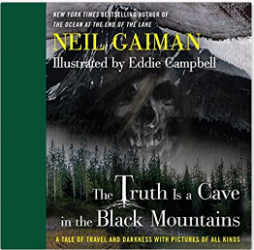
As I’d realized in previous works of Neil Gaiman’s that I’ve read, he excels at (at least) two things: short stories and fairy tales. One could argue that the latter is a subset of the former, but longer works like Stardust cause me to separate the distinction. Perhaps this book was made all the more magical by its audiobook production. Not only did the author himself read it, but it was accompanied with some great atmospheric music to enhance the mood produced by Gaiman’s words. I missed the illustrations this book sports, but I think the words can speak for themselves.
In terms of a fairy tale, The Truth is a Cave in the Black Mountains manages to contain the usual flare of morality and truth against a backdrop of riches and mysterious wonder. I’m almost surprised there aren’t more authors writing modern fairy tales as Gaiman has since there is a precise formula here that Gaiman has consistently used to create these fantastical narratives. After all, most fairy tales are trying to teach something intrinsically human, and this one touches on the oft-repeated moral of greed versus the consequences of obtaining wealth.
Of course, much like Gaiman’s other “fairy tale” works, this story is intended for adults. Sure, traditional fairy tales are gruesome and are used to scare children into submission. Regardless, the lesson contained in this story is something most adults need to hear. We all love the idea of the “get rich quick” scheme, but there are often secondary effects that we overlook when we head out to seek our fortunes. Perhaps if the more adult aspects were toned down a little, it could be used to teach children about these moral pitfalls before they encounter them, instead of after the fact.
Another superb adult fairy tale, I give The Truth is a Cave in the Black Mountains 4.0 stars out of 5.
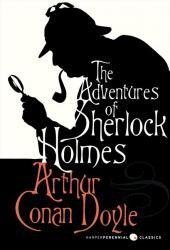
Sherlock Holmes and his assistant Dr. Watson have captivated audiences for generations. This collection of twelve short stories is fantastic. From stolen jewels to mysterious circumstances and brilliant crimes, The Adventures of Sherlock Holmes has it all. The Adventures of Sherlock Holmes is full of mesmerizing deductions and wonderful short adventures. I highly recommend this collection of short stories for every Sherlock Holmes fan and anyone searching for great mystery novels or short stories.
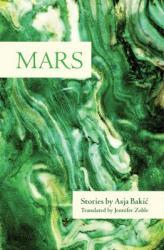
A debut collection of short stories by Bosnian feminist Asja Bakic who uses dystopian, science and speculative fiction techniques to shine a light on gender relations through lenses of eroticism, skewed humor and horror. The stories are a series of twisted universes set in the former Yugoslavia and Mars. The main characters must make sense of their strange reality whether they are a woman who will be freed from purgatory once she writes the perfect book (Day Trip to Durmitor), a woman who awakens with no memory before learning the truth about herself (Abby) to another meeting her clone (Asja 5.0).
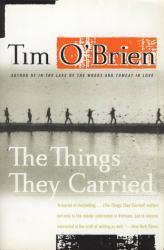
The Things They Carried follows through the perspective of a soldier within the 23rd Infantry Division. Enlisted during the Vietnam War, the book covers over the soldier's, as well as the platoons experiences throughout. The Things They Carried is a collection of stories that correlate to one another, bringing an ultimate immersion to those that are interested of any war, or historical context.
The Things They Carried is a book that has a deeper insight within the emotional, mental, and physical state of the soldiers that went through the Vietnam War. Having a darker and more serious tone than other novels, it is one that stands out and deserves recognition.
Reviewer Grade: 11

A graphic novel featuring true reports of sexual harassment and assault in its many forms. A really powerful, quick read. My only problem with it is I wish it was longer. I read it in about 30 minutes. I did like the format of graphic novel. It made it seem more lighthearted than it actually is, which further illustrates the darkness of the subject matter.
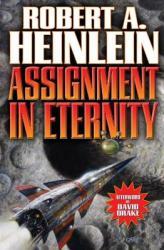
Back in college, my first introduction to Heinlein was Stranger in a Strange Land. I had to read this book for my “Science in Literature” course, and I found it moderately interesting. Since then, I’ve read other Heinlein books like Starship Troopers and The Moon is a Harsh Mistress, but I didn’t realize how dedicated Heinlein was to some of his “supernatural” themes until I read Assignment in Eternity. Sure, most authors will have some concept or idea that they like to revisit. Still, the fact that a majority of Assignment in Eternity ’s included short stories deal in some way with “superhumans” must mean something.
The whole concept of ESP and “evolved” humans isn’t interesting to me since I don’t think there’s much that can be done with the concept. While Stranger in a Strange Land covered most of the bases, Assignment in Eternity doesn’t really expand the ideas any further. If anything, Stranger in a Strange Land was the culmination of Heinlein’s obsession with this topic. I think, in the end, the whole idea of telepathy and other mind powers isn’t science fiction as much as the ideas explored by Ray Bradbury or Isaac Asimov.
Because Heinlein could fill a book with short stories mostly centering on this theme speaks volumes about the overall topics in his writing. If you’re into this kind of story, then Assignment in Eternity is an excellent addition to the classic that is Stranger in a Strange Land. If anything, Heinlein is consistent in his style, even if it makes short stories like this somewhat repetitive to the other stories and books he’s written. Like other short story collections, I would have liked to see some more variety in what was presented here, but I suppose beggars can’t be choosers.
More of the same Heinlein, just in smaller chunks, I give Assignment in Eternity 3.0 stars out of 5.
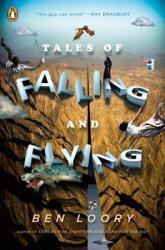
This book is a compilation of short stories, which are filled with humorous tales and great short stories. I personally really liked this book because of how every story was a perfect duration. I often find it hard to commit to a book for more than a week, with this book, I was constantly entertained by the fun theme of all the stories. If you're looking for a great compilation of bed time stories, or just don't have the time to commit to a long chapter book, this book is perfect for you. If you are looking for one great story to start the adventure, my favorite was The Squid Who Fell in Love With The Sun.
Reviewer Grade: 8